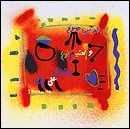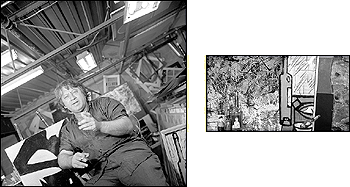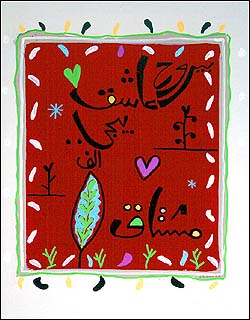
|

Expression from Arab popular culture, "No credit, no hard feelings; God gives to everyone", 1995 Mixed media on vinyl tile Collection of the Canadian Museum of Civilization (Photo: Harry Foster © Canadian Museum of Civilization Corporation) " For certain of my works, I find my ideas by studying Arab proverbs, maxims and sayings, those I know and those I remember. [...] I use writing in a popular style, by integrating the inscriptions that I used to see on cars, walls, shop windows and motorbikes. I don't want to write them in diwani or in koufi, nor in any other stylized calligraphy, because that would seem artificial. " " You can do anything with Arab letters - you can make them jump,
you can make them dance, you can even make them sing! " Extracts from interviews with the artist Half-Kurd, half-Kazakh, Shwan was born in a city in the south of Iraq in 1955. At a young age, he already showed a strong desire to learn to paint, but his refusal to join his country's single party closed the doors of art schools to him. Thus, he proceeded to Italy in 1977, and earned a diploma from the Fine Arts Academy of Perugia in 1982. The precariousness of his status and the fear of being sent back to Iraq encouraged him to immigrate to Canada, where, he was told, the standard of living was high. He arrived in Edmonton in 1983, but preferred to settle in Toronto, where the artistic milieu seemed to him more dynamic.  Shwan, North York, Ontario, 1999 Camille Zakharia Iris digital prints Collection of the Canadian Museum of Civilization During his years of study in Italy, he was attracted to several artists, in particular Bori, Tapiés and Miró-and later to the American abstract painters of the group Action Painting and Willem de Kooning. Wishing to innovate, he systematically copied the works he admired in order to discover their secrets. Audacious, he used unusual materials and supports such as coffee, wine, nail polish, vinyl tiles and photographic paper, and invented new techniques. He has essentially developed two approaches in his art: the first, more aesthetic, pays particular attention to the composition of the painting; the second, more playful, is inspired by popular Arab culture. 
Expression from Arab popular culture, "A lover leaves, and a thousand others show up", 1996 Mixed media on paper Collection of the Canadian Museum of Civilization (Photo: Harry Foster © Canadian Museum of Civilization Corporation) In the latter approach, he brings together, not only motifs and symbols, but also sayings and expressions, such as "The eye of the envious does not prevail" or "Don't follow me, I'm engaged," that recall scenes of daily life in the Middle East, the prevailing ambience of working-class neighbourhoods, and the inscriptions seen on taxis, buses and motorcycles, which make the passer-by smile. Not compelled to follow the rules of traditional or modern Arab calligraphy, nor those of classical painting, he makes the letters and colours dance joyfully right up to the painting's frame. Shwan has to his credit some 50 solo and collective exhibitions, notably in Italy, Canada and the United States. Several of his works are part of the Canadian Museum of Civilization's collection. |